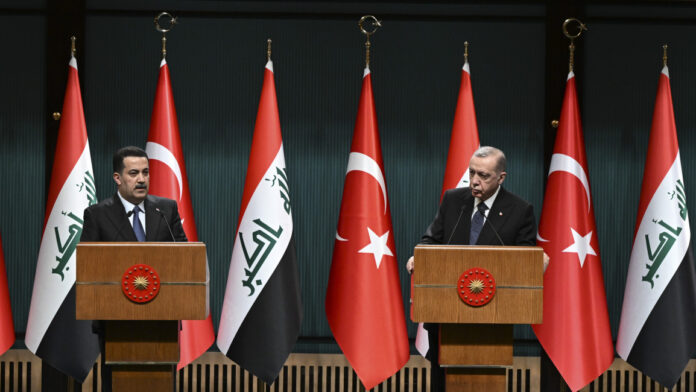Turkish President Recep Tayyip Erdogan is expected to embark on a crucial visit to Iraq in a bid to address simmering tensions and bolster bilateral relations. This will mark his first official trip to the nation since assuming office.
The anticipated visit, slated to take place either by late March or early April, aims to delve into a spectrum of pressing political, security, and economic issues between the two neighbouring nations.
Erdogan’s impending visit to Baghdad and Erbil, the capital of the Kurdistan Region, is significant given the escalating discord between Ankara and Baghdad.
This visit comes on the heels of strained relations, exacerbated by longstanding issues such as the presence of the Kurdistan Workers’ Party (PKK) and disputes over water resources and oil exports.
In conversation with Turkey’s state-run Anadolu agency, Turkish Deputy Foreign Minister Ahmet Yildiz disclosed that meticulous planning and preparations are underway, hinting at a scheduled visit before the end of April.
The itinerary is poised to encompass discussions in both the Iraqi capital and the Kurdish stronghold. Erdogan will lead a delegation comprising high-ranking Turkish officials, business figures, and representatives from various companies.
One of the paramount agendas on Erdogan’s docket is the pursuit of a comprehensive security agreement with the Iraqi government, particularly concerning border control.
Additionally, Erdogan is anticipated to push for Baghdad’s backing of Turkey’s anticipated military operations against PKK militants, slated for April.
However, securing Iraq’s consent for such military incursions remains a formidable challenge for Erdogan, as emphasized by Kurdish political observer Massoud Abdul Khaliq.
Abdul Khaliq elucidated that Baghdad’s refusal to entertain a Turkish proposal for a joint operations room against PKK insurgents in the Qandil Mountains underscores Iraq’s reluctance to endorse Turkish military interventions on its soil.
Furthermore, tensions have escalated with Turkey’s accusations against the Patriotic Union of Kurdistan (PUK), alleging the harbouring of PKK elements within its territories.
Erdogan’s recent admonishments directed at the PUK reflect Ankara’s unwavering stance on combating perceived threats to its national security.
The intricacies of oil exports from Iraq to Turkey further complicate bilateral relations, with Ankara’s reluctance to resume exports through the Ceyhan port and Iraq’s pursuit of alternative pipelines through Syria.
Despite Turkey’s efforts to sway Iran into joint operations against the PKK, Tehran’s resistance remains a stumbling block in Ankara’s ambitions.
Against the backdrop of these contentious issues, the United States stands as a pivotal player, advocating against Turkish military forays into Iraqi Kurdistan.
With geopolitical complexities at play, Erdogan’s visit to Iraq assumes paramount importance in fostering dialogue, addressing mutual concerns, and charting a path towards regional stability.
As Erdogan prepares to navigate diplomatic terrain fraught with challenges, the outcome of his rendezvous in Iraq holds profound implications for the Middle East’s geopolitical landscape.
This article was created using automation technology and was thoroughly edited and fact-checked by one of our editorial staff members

